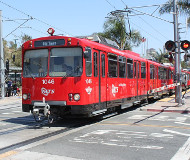9/21/2016
Opinion: Feds Divert Yet More Motorist Money Into TrolleysFeds spend $1 billion on trolley in San Diego, California. Washington, DC trolley costs taxpayers $9.50 per ride.

The US Department of Transportation last week announced it would send $1 billion in cash raised from gasoline taxes to subsidize the construction of an old-fashioned trolley in San Diego, California. Around the country, the return of this Civil War-era technology has generated controversy over the costs involved. Federal officials have responded by giving priority to projects in the most exciting locations.
"The beautiful weather and strong job market have long made San Diego one of America's most desirable and fastest-growing metro areas," acting Federal Transit Administrator Carolyn Flowers explained. "But, as Southern Californians well know, that often means more cars on the road and more congestion."
Southern California is also well known for its car culture. According to the Census Bureau's American Community Survey, nearly 97 percent of Dan Diegans have access to at least one automobile in their household. Over 87 percent of residents commute to work in a car or on a motorcycle, compared to just 5 percent who take transit or 0.6 percent who use a bicycle. Four percent work from home.
Officials chose to advance the billion-trolley project over alternatives that included bus rapid transit and expansion of the existing freeways used by nine out of ten workers. Construction begins October 22, with the eleven-mile route scheduled to open for service in 2021.
Washington, DC's newly opened, and long troubled, $230 million trolley project raises questions about the financial sustainability of such projects. The DC streetcar does not charge riders along its 2.4 mile route for fear of discouraging ridership. That means the $8 million spent annually to support monthly ridership of about 70,000 imposes a net subsidy of $9.50 each time anyone steps on board. Members of Congress have questioned the wisdom of the expensive project.
"While streetcars are the current transportation fad, one must wonder why DC needs one in the first place," US Senator Rand Paul (R-Kentucky) said in a statement. "Some cities that lack rail transit systems have turned to streetcars, but DC's streetcar overlays its existing subways system, the Metro, which boasts approximately forty stops within the district's boundaries (the Metro goes on to service Virginia and Maryland)."
In terms of performance, The Washington Post estimated the DC trolley took 26 minutes to travel 2.2 miles along H Street, saving one minute over walking. A trip by Uber, by contrast, took just 7 minutes. An Uber ride over the same route would cost an estimated $7 to $9, and even less with a shared ride, compared to the subsidized cost of $9.50.


